- Home
- Charles de Lint
Tapping the Dream Tree Page 3
Tapping the Dream Tree Read online
Page 3
“So these two things I called over,” she said. “They’re the hoodoo men from your story?”
Robert shrugged. “Oh, they’re not the same pair, but it’s an old story and old stories have a habit of repeating themselves.”
“Who won that first duel?” William asked.
“One of ‘em turned himself into a virus and got the other too sick to shape a spell in reply, but I don’t know which one. Doesn’t much matter anyway. By the time that happened, the one was as bad as the other. Get into that kind of a state of mind and after a while you start to forget things like kindness, decency … the fact that other people aren’t put here in this world for you to feed on.”
Staley’s heart sank lower.
“We’ve got to do something about this,” she said. “I’ve got to do something. I’m responsible for whatever hurt they cause, feeding on people and all.”
“Who says it’s your fault?” Robert wanted to know.
“Well, I called them over, didn’t I? Though I don’t understand how I did it. I’ve been playing my music for going on four years now in that meadow and nothing like this has ever happened before.”
Robert nodded. “Maybe this time the devil was listening and you know what he’s like. He purely hates anybody can play better than him—’specially if they aren’t obliged to him in some way.”
“Only person I owe anything to,” Staley said, “is my grandma and she was no devil.”
“But you’ve been at the crossroads.”
Staley was starting to understand what he meant. There was always something waiting to take advantage of you, ghosts and devils sitting there at the edge of nowhere where the road to what is and what could be cross each other, spiteful creatures just waiting for the chance to step into your life and turn it all hurtful. That was the trouble with having something like her spirit fiddle. It called things to you, but unless you paid constant attention, you forgot that it can call the bad as well as the good.
“I’ve been at a lot of places,” she said.
“You ever played that fiddle of yours in one?”
“Not so’s I knew.”
“Well, you’ve been someplace, done something to get his attention.”
“That doesn’t solve the problem I’ve got right now.”
Robert nodded. “No, we’re just defining it.”
“So what can I do?”
“I don’t know exactly. Thing I’ve learned is, if you call up something bad, you’ve got to take up the music and play it back out again or it’ll never go away. I’d start there.”
“I already tried that and it only made things worse.”
“Yeah, but this time you’ve got to jump the groove.”
Staley gave him a blank look.
“You remember phonograph records?” Robert asked.
“Well, sure, though back home we mostly played tapes.”
Robert started to finger his guitar again, another spidery twelve-bar blues.
“Those old phonograph records,” he said. “They had a one-track groove that the needle followed from beginning to end—it’s like the habits we develop, the way we look at the world, what we expect to find in it, that kind of thing. You get into a bad situation like we got here and it’s time to jump the groove, get someplace new, see things different.” He cut the tune short before it could resolve and abruptly switched into another key. “Change the music. What you hear, what you play. Maybe even who you are. Lets you fix things and the added bonus is it confuses the devil. Makes it hard for him to focus on you for a time.”
“Jump the groove,” Staley repeated slowly.
Robert nodded. “Why don’t we take a turn out to where you’ve been living and see what we can do?”
I call in a favor from my friend Moth who owns a junkyard up in the Tombs and borrow a car to take us back up to Staley’s trailer. “Take the Chevette,” he tells me, pointing out an old two-door that’s got more primer on it than it does original paint. “The plates are legit.” Staley comes with me, fusses over Moth’s junkyard dogs like they’re old pals, wins Moth over with a smile and that good nature of hers, but mostly because she can run through instrumental versions of a couple of Boxcar Willie songs. After that, so far as Moth’s concerned, she can do no wrong.
“This guy Robert,” she says when we’re driving back to the bar to pick him up. “How come he’s so fixed on the devil?”
“Well,” I tell her. “The way I heard it, a long time ago he met the devil at a crossroads, made a deal with him. Wanted to be the best player the world’d ever seen. ‘No problem,’ the devil tells him. ‘Just sign here.’
“So Robert signs up. Trouble is, he already had it in him. If he hadn’t been in such a hurry, with a little time and effort on his part, he would’ve got what he wanted and wouldn’t have owed the devil a damn thing.”
Staley’s looking at me, a smile lifting one corner of her mouth.
“You believe that?” she says.
“Why not? I believed you when you told me there was a boy under the skin of that rabbit.”
She gives me a slow nod.
“So what happened?” she asks.
“What? With Robert? Well, when he figured out he’d been duped, he paid the devil back in kind. You can’t take a man’s soul unless he dies, and Robert, he’s figured out a way to live forever.”
I watch Staley’s mouth open, but then she shakes her head and leaves whatever she was going to say unsaid.
“ ‘Course,” I go on, “it helps to stay out of the devil’s way, so Robert, he keeps himself a low profile.”
Staley shakes her head. “Now that I can’t believe. Anybody hears him play is going to remember it forever.”
“Well, sure. That’s why he doesn’t play out.”
“But—”
“I’m not saying he keeps his music to himself. You’ll find him sitting in on a session from time to time, but mostly he just plays in places like that bar we found him in today. Sits in a corner during the day when the joint’s half empty and makes music those drunks can’t ever forget—though they’re unlikely to remember exactly where it was that they heard it.”
“That’s so sad.”
I shrug. “Maybe. But it keeps the devil at bay.”
Staley’s quiet for a while, doesn’t say much until we pull into the alley behind the bar.
“Do you believe in the devil?” she asks before we get out of the car.
“Everybody’s got devils.”
“No, I mean a real devil—like in the Bible”
I sit for a moment and think on that.
“I believe there’s good in the world,” I tell her finally, “so yeah. I guess I’ve got to believe there’s evil, too. Don’t know if it’s the devil, exactly—you know, pointy horns, hooves and tail and all— but I figure that’s as good a name as any other.”
“You afraid of him?”
“Hell, Staley. Some days I’m afraid of everything. Why do you think I spent half my life looking for oblivion in a bottle?”
“What made you change?”
I don’t even have to think about that.
“Malicorne,” I tell her. “Nothing she said or did—just that she was. I guess her going away made me realize that I had a choice: I could either keep living in the bottom of a bottle, and that’s not living at all. Or I could try to experience ordinary life as something filled with beauty and wonder—you know, the way she did. Make everyday something special.”
Staley nods. “That’s not so easy.”
“Hell, no. But it’s surely worth aiming for.”
William drove, with Staley riding shotgun and Robert lounging in the back, playing that old Gibson of his. He worked up a song about their trip, a sleepy blues, cataloguing the sights, tying them together with walking bass lines and bottleneck solos. Staley had made this drive more times than she could count, but all those past trips were getting swallowed by this one. The soundtrack Robert was putting to it would forever be th
e memory she carried whenever she thought about leaving the city core and driving north up Highway 14, into the hills.
It took them a couple of hours after picking Robert up at the bar to reach that stretch of county road closest to Staley’s trailer. The late afternoon sun was in the west, but still high in the summer sky when Staley had William pull the Chevette over to the side of the road and park.
“Can we just leave the car like this?” William asked.
Staley nodded. “I doubt anybody’s going to mess with it sitting here on the edge of Indian land.”
She got out and stretched, then held the front seat up against the dash so that Robert could climb out of the rear. He kicked at the dirt road with his shoe and smiled as a thin coat of dust settled over the shiny patent leather. Leaning on the hood of the car, he cradled his guitar against his chest and looked out across the fields, gaze tracking the slow circle of a hawk in the distance.
“Lord, but it’s peaceful out here,” he said. “I could listen to this quiet forever.”
“I know what you mean,” Staley said. “I love to travel, but there’s nowhere else I could call home.”
William wasn’t as content. As soon as he got out of the car, a half-dozen deerflies dive-bombed him, buzzing round and round his head. He waved them off, but all his frantic movement did was make them more frenzied.
“What’s the matter with these things?” he asked.
“Stop egging them on—all it does is aggravate them.”
“Yeah, right. How come they aren’t in your face?”
“I’ve got an arrangement with them,” Staley told him.
They weren’t bothering Robert either. He gave the ones troubling William a baleful stare.
“ ‘Predate it if you’d leave him alone,” he told them.
They gave a last angry buzz around William’s head, then zoomed off down the road, flying like a fighter squadron in perfect formation. William followed their retreat before turning back to his companions.
“Nice to see some useful hoodoo for a change,” he said.
Robert grinned. “It’s all useful—depending on which side of the spell you’re standing. But that wasn’t hoodoo so much as politeness. Me asking, them deciding to do what I asked.”
“Uh-huh.”
Robert ignored him. “So where’s this trailer of yours?” he asked Staley.
“Back in the woods—over yonder.”
She led them through the raspberry bushes and into the field. Robert started up playing again and for the first time since they’d met, Staley got the itch to join him on her fiddle. She understood this music he was playing. It talked about the dirt and crushed stone on the county road, the sun warm on the fields, the rasp of the tall grass and weeds against their clothes as they walked in single file towards the trees. Under the hemlocks, the music became all bass and treble, roots and high boughs, the midrange set aside. But only temporarily.
When they reached the bottle tree, Staley glanced back. William gave the hanging bottles a puzzled look, but Robert nodded in apparent approval. His bottleneck slide replied to the clink of glass from the bottle tree, a slightly discordant slur of notes pulled off the middle strings of the Gibson.
The bluesman and Grandma would’ve got along just fine, she decided.
Once they came out from under the trees, they could walk abreast on the shorter grass. Robert broke off playing when Staley gave her scarecrow a little curtsey by way of greeting.
“How well do you know that fellow?” he asked.
Staley smiled. “About four years—ever since I put him up.”
“The clothes were yours?”
She nodded.
“And you collected the wood for his limbs?”
She nodded again. “Why are you asking all these questions?”
“Because he’s halfway alive.”
“You mean the branches sprouting?”
“No, I mean he’s got the start of an individual spirit, growing there in the straw and applewood.”
Staley regarded the scarecrow in a new light. Now that it had been pointed out, she could feel the faint pulse of life in its straw breast. Sentient life, not quite fully formed, but hidden there as surely as there’d been a boy hidden in the raggedy hare she’d lost in the city.
“But, how … ?” she began, her voice trailing off.
Robert turned in a slow circle, taking in the whole of the meadow. Her trailer, the vegetable garden.
“You’ve played a lot of music in here,” he said. “Paid a lot of attention to the rhythms of the meadow, the forest, how you and your belongings fit into it. It’s got so’s you’ve put so much hoodoo in this place I’m surprised you only ever called over those two feuding spirits.”
William nodded. “Hell, even I feel something.”
Staley did, too, except it was what she always felt when she was here.
“I thought it was home I was feeling,” she said.
“It is,” Robert said. “But you’ve played it up so powerful it’s no wonder the devil took notice.”
Staley shot a glance at her scarecrow, which made Robert smile.
“Oh, he’s more subtle than that,” he told her. “He’s going to come up at you from the backside, like pushing through a couple of feuding spirits to wreck a little havoc with the things you love.” He gave her fiddle case a considering look. “You know what you’ve got to do.”
Staley sighed. “Jump the groove.”
“That’s right. Break the pattern. Don’t give the devil something he can hold on to. Nothing’s easier to trip a body up than habits and patterns. Why do you think the Gypsy people consider settling down to be so stressful? Only way they can rest is by traveling.”
“You’re saying I should go? That I’ve got to leave this place?”
Robert raised an eyebrow. “You a Romany girl now?”
“No.”
“Then find your own groove to jump.”
Staley sighed again. Intellectually, she understood what Robert was getting at. But how to put it into practice? She played the way she played because … well, that was the way she played. Especially here, in this place. She took the music from her surroundings, digging deep and deeper into the relationships between earth and sky, forest and meadow, her trailer and the garden and the tattered figure of the scarecrow watching over it all. Where was she supposed to find a music still true to all of this, but different enough to break the pattern of four summers immersed in its quiet joys and mysteries?
“I don’t know if I can do it,” she said.
“You can try,” Robert told her.
“I suppose. But what if I call something worse over?”
“You didn’t call anything over. Those spirits were sent.”
Staley shook her head. “This fiddle of Grandma’s plays a calling-on music—I can hear it whenever I play.”
“I don’t deny that,” Robert said. “But you’ve got to put some intent into that call, and from what you’ve been telling me, you didn’t intend to bring anything over last night.”
“So when those blackbirds gather to her fiddling,” William said, “it’s because she’s invited them?”
Robert shrugged. “Crows and ravens are a whole different circumstance. They live on the outside of where we are and they learned a long time ago how to take advantage of the things we do, making their own hoodoo with the bits and pieces we leave behind.”
That made sense to Staley. She’d never deliberately called up the blackbirds, but they came all the same. Only not here. That was why she’d always thought it was safe to play whatever she wanted around the trailer. She’d see them from time to time, mostly going after her garden, or sneaking off with a bit of this or that for their nests, but they didn’t gather here. The closest roost was out by the highway.
She glanced at Robert to find his gaze on her, steady but mild. She wanted to say, How do I know the devil’s not being so subtle that he’s persuading me through you? But they’d been t
alking long enough. And whatever else Robert was, she doubted he was the devil.
Kneeling on the grass, she cracked open her fiddle case. Took out her bow, tightened the frog, rosined the hairs. Finally she picked up the blue spirit fiddle her grandmother had given her and stood up again. She ran a finger across the strings. The E was a touch flat. She gave its fine-tuner a twist, and tried again. This time all four strings rang true.
“Here goes nothing,” she said, bringing the fiddle up under her chin.
“Not like that,” Robert told her. “Dig a little with your heart before you start in on playing. You can’t jump the groove until you know where it’s at.”
True, she thought.
William gave her an encouraging nod, then walked over to the trailer and sat down on the steps. After a moment Robert joined him, one hand closed around the neck of his guitar, damping the strings.
Staley took a breath and let it out, slow. She held the fiddle in the crook of her arm, bow dangling from her index finger, and closed her eyes, trying to get a feel of where the meadow was today, how she fit into it. She swayed slightly where she stood. Toe on heel, she removed one shoe, then the other, digging through the blades of grass with her bare toes until she was in direct contact with the earth.
What do I hear? she thought. What do I feel?
Woodpecker hammering a dead tree limb, deeper in the woods. The smell of grass rising up from by her feet. Herbs from the garden, mint, basil, thyme. The flutter and sweet chirps of chickadees and finches. A faint breeze on her cheek. The soft helicopter approach of a hummingbird, feeding on the purple bergamot that grew along the edge of the vegetable and herb beds. The sudden chatter of a red squirrel out by the woodpile. Something crawling across her foot. An ant, maybe. Or a small beetle. The hoarse croak of a crow, off in the fields somewhere. The sun, warm on her face and arms. The fat buzz of a bee.
She knew instinctively how she could make a music of it all, catch it with notes drawn from her fiddle and send it spiraling off into the late afternoon air. That was the groove Robert kept talking about. So where did she go to jump it?
The first thing she heard was what Robert would do, bottleneck slides and bass lines, complicated chord patterns that were both melody and rhythm and sounded far simpler than they were to play. But while she could relate to what his take would be—could certainly appreciate it and even harmonize with it—that music wasn’t hers. Following that route wouldn’t be so much jumping her own groove as becoming someone else, being who they were, playing the music they would play.

 Widdershins
Widdershins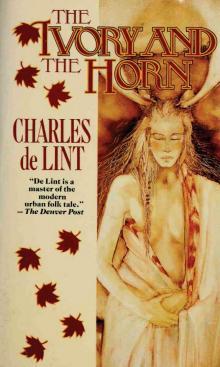 The Ivory and the Horn
The Ivory and the Horn Yarrow
Yarrow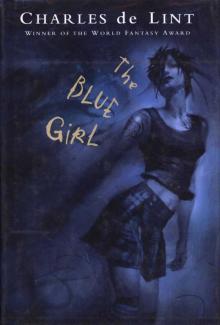 The Blue Girl
The Blue Girl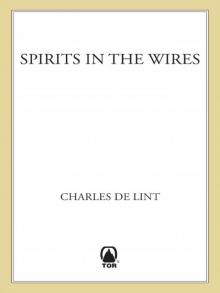 Spirits in the Wires
Spirits in the Wires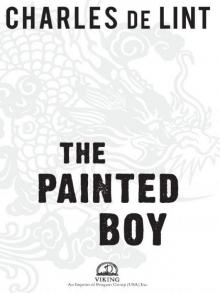 The Painted Boy
The Painted Boy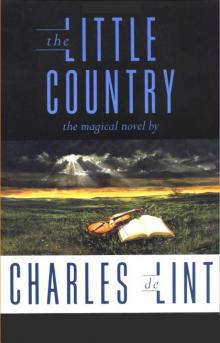 The Little Country
The Little Country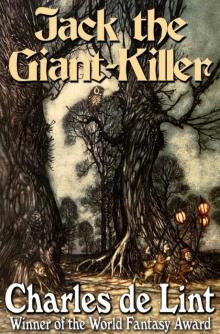 Jack of Kinrowan: Jack the Giant-Killer / Drink Down the Moon
Jack of Kinrowan: Jack the Giant-Killer / Drink Down the Moon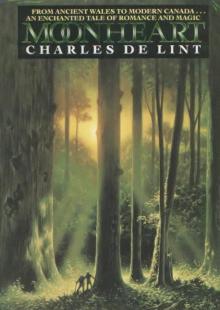 Moonheart
Moonheart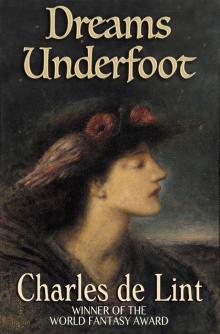 Dreams Underfoot
Dreams Underfoot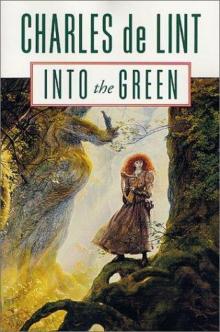 Into the Green
Into the Green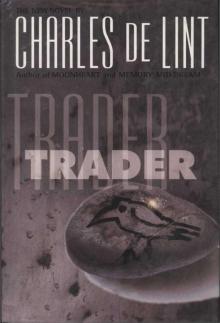 Trader
Trader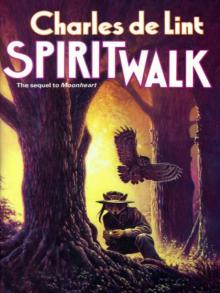 Spiritwalk
Spiritwalk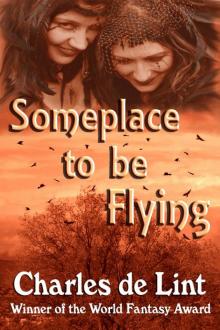 Someplace to Be Flying
Someplace to Be Flying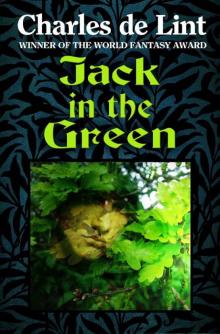 Jack in the Green
Jack in the Green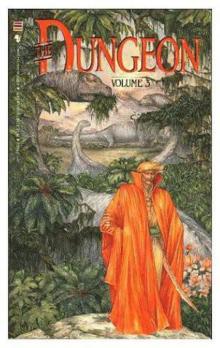 The Valley of Thunder
The Valley of Thunder Out of This World
Out of This World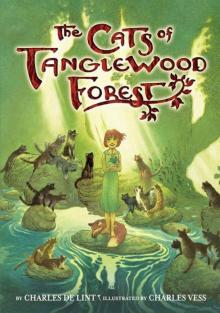 The Cats of Tanglewood Forest
The Cats of Tanglewood Forest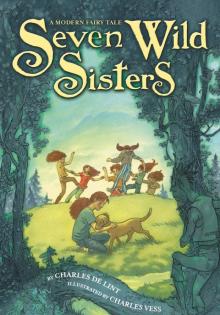 Seven Wild Sisters
Seven Wild Sisters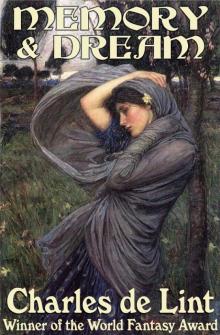 Memory and Dream
Memory and Dream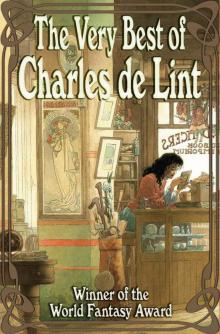 The Very Best of Charles De Lint
The Very Best of Charles De Lint Under My Skin
Under My Skin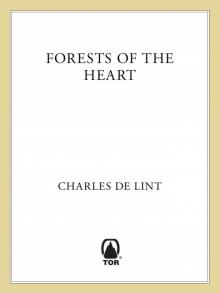 Forests of the Heart
Forests of the Heart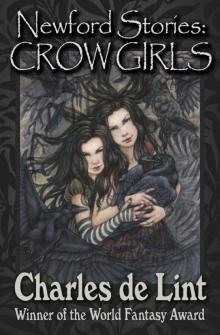 The Newford Stories
The Newford Stories Moonlight and Vines
Moonlight and Vines Angel of Darkness
Angel of Darkness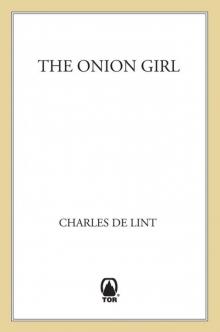 The Onion Girl
The Onion Girl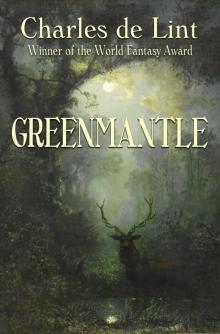 Greenmantle
Greenmantle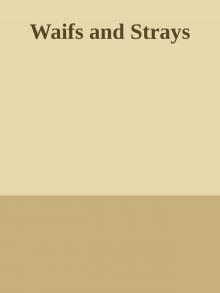 Waifs And Strays
Waifs And Strays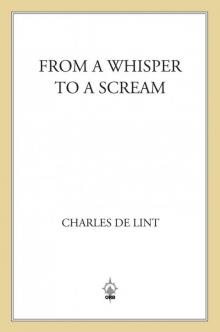 From a Whisper to a Scream
From a Whisper to a Scream Over My Head
Over My Head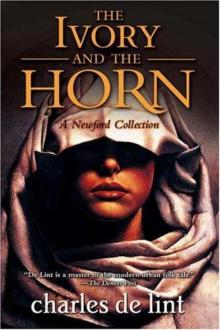 The Ivory and the Horn n-6
The Ivory and the Horn n-6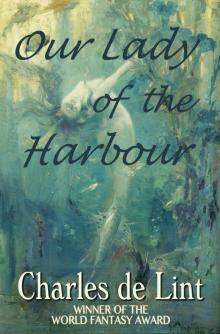 Our Lady of the Harbour
Our Lady of the Harbour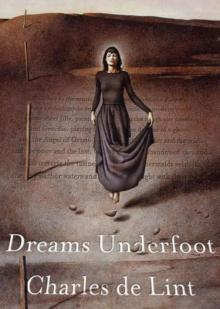 Dreams Underfoot n-1
Dreams Underfoot n-1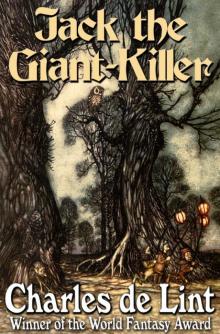 Jack the Giant-Killer (Jack of Kinrowan Book 1)
Jack the Giant-Killer (Jack of Kinrowan Book 1)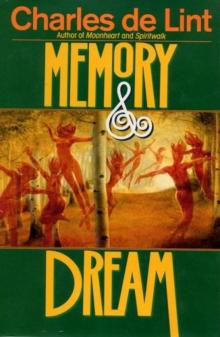 Memory and Dream n-5
Memory and Dream n-5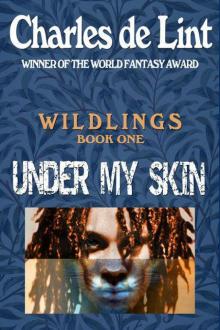 Under My Skin (Wildlings)
Under My Skin (Wildlings)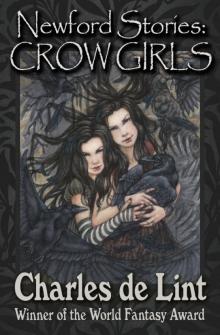 Newford Stories
Newford Stories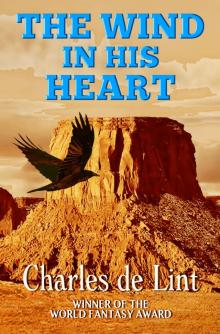 The Wind in His Heart
The Wind in His Heart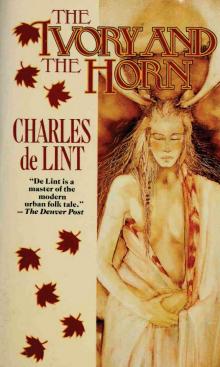 Ivory and the Horn
Ivory and the Horn